- Home
- Muriel Spark
The Complete Short Stories Page 35
The Complete Short Stories Read online
Page 35
‘A Sad Tale’s Best for Winter’
There was a man lived by a graveyard. His name was Selwyn Macgregor, the nicest boy who ever committed the sin of whisky.
‘Selwyn, what a place to live.’
‘Have a tot for the road, dear.’
‘Oh, Selwyn!’
‘I get my letter tomorrow. Tomorrow I get the letter. ‘Now, Selwyn Macgregor!’
‘It always arrives the first of the month. The first it always comes.
‘Macgregor, you’re a case. Make it a small one.’
‘For the road, mind.’
‘Mac, I’m on my way. What a place to live, what a graveyard and the mucky old church with the barbed wire round it, who’d ever want to trespass within yon?’
‘Cheerio, cheers!’
‘Here’s to you, Mr Macgregor. I would have to be a sore old tramp to shelter in yon for the night. The barbed wire I cannot understand, I can not.’
‘The money comes on the first.’
‘I’m away, Selwyn, the night’s begun to rise.’
So it continued for thirteen years, with Selwyn increasing in age from twenty-five to thirty-eight. At twenty-five he was invalided out of the army, at thirty-eight was still living in the shack in the garden of the fallen manse. There by the graveyard he was still getting his letter from Edinburgh every month on the 1st, when he would cash the cheque.
‘Good evening, Mr Macgregor.
‘Just a tot, the both of you, come on now.
‘Mr Macgregor, we beg to inquire, will you play the piano at the concert?’
‘Aw, but that’s to be the middle of the month.’
‘Mac, you will play us a piece.
‘Mid-month I’ll be in contemplation.
‘No more for me — well, a small … that’s enough, Mr M.’
‘Cheerio!’
‘We’ll put you down for a tune then, Selwyn.’
‘Aw no, I said.’
‘Mr Selwyn, you’ll go melancholy mad. What a place to dwell by!’
‘Here’s luck t’you both.’
Always, about the middle of the month, Selwyn’s money ran dry. Then he would go thirsty; he wouldn’t open the door to anyone even if they had a plate of dinner in their hands. He lived on what he could get, turnips and sometimes the loaves and dinners which they left on the doorstep. The 25th of the month he opened his doors again, borrowed a bit till the 1st, received visitors, brought out the bottle.
But in those ten silent days between the middle of the month and the 25th Selwyn Macgregor would sit by his window and contemplate the graves of the dead.
Selwyn’s aunt lived in a tenement flat in the Warrender district of Edinburgh. Those flats were once occupied by people of good substance and still here and there contain a whole lot of wealth behind the lack of show.
‘The district’s going down,’ Selwyn’s aunt was saying for twenty years. But let anyone come and tell her, ‘This quarter’s going down’:
‘Not in my consideration, it isn’t,’ she would say.
It was Selwyn’s Aunt Macgregor who, in view of the fact that his mother had been Welsh, sent him his monthly cheque, for it wasn’t Selwyn’s fault that his mother had been Welsh and mad or at least bone lazy. What’s bred in the bone comes out.
There wouldn’t be much point in going into many details about Aunt Macgregor, what she looked like in her navy blue and how her eyes, nose and mouth were disposed among the broken veins of her fine severe old face, because her features went, as Selwyn said, under the earth where corruption is, and her navy blue went to the nurse.
Well, she died. Some months before, you must know, she visited Selwyn up there in that shack by the graveyard. She wore her brown, for she was careful with the navy. So up she went on the excursion to Selwyn Macgregor. He wasn’t contemplating just then, so the doors were open.
‘Auntie Macgregor! A little drop, Auntie, oh come on, a bit of a drop. That’s the girl.’
‘Selwyn,’ she said, ‘you’re the worse.
‘Worse than what?’ Although Selwyn knew she meant for the drink.
‘Worse than what? Worse than who? Than who-oo-ooo?’ Selwyn kept on chanting, and she started to laugh. She had a soft spot really for Selwyn.
Well, she died and left him a packet. Selwyn travelled to the funeral, a bitter cold day. Bitter cold, and naturally he had his flask in his pocket. For you must know Selwyn entertained a lively faith in the Resurrection; work it out, there was no dishonour meant to Aunt Macgregor by Selwyn’s taking precautions against the cold at the graveside though he tottered and there was talk.
‘Dust to dust…’
‘That’s never Miss Macgregor’s nephew! Surely yon’s never!’
‘That’s the chief mourner, her brother’s boy. What’s he up to for the Lord’s sake?’
Selwyn lifted a handful of earth. But then, then, he stood looking at it with his smile. There was the coffin waiting and all the people waiting. So when the minister nodded as if to say, ‘All right, toss it on the coffin,’ Selwyn flung the earth over his left shoulder out of force of habit, as he did at home with the salt. After that he beamed round at the mourners as much as to say, ‘Here’s health!’ or ‘Cheerio!’ or some similar saying.
‘Poor Miss Macgregor. The only relative, poor soul.’
Shortly afterwards Selwyn received a letter about his aunt’s will from one of the trustees. It was rather complicated, and so Selwyn wrote, ‘Come and see me after the 25th. And he busied himself with contemplation until that date. On the 26th the trustee arrived at Selwyn’s door with his healthy face and dark overcoat. Selwyn thought, what a nice wee trustee, here’s hoping he’s brought some ready.
‘Make yourself at home,’ said Selwyn, getting out another glass.
‘Ta,’ said the man.
‘Here’s hoping,’ Selwyn said.
And eventually this trustee said to Selwyn, ‘You know the provision in Miss Macgregor’s will?’
‘I did notice something,’ Selwyn declared, ‘in that letter you sent me but I was busy at the time.’
So the man read out the will, and when he came to the bit ‘… to my nephew Selwyn Macgregor…’ he stopped and looked at Selwyn, … providing,’ he continued, ‘he looks after his health.’
‘My auntie all over,’ Selwyn said and filled up the glasses. ‘A very fine woman, Mr —?’
‘Brown,’ said the man. ‘My partner Mr Harper is the other trustee. You’ll get on fine with him. When will you be moving from here?’
‘Aw when I’m dead,’ said Selwyn.
‘Now, Mr Macgregor, this is not a healthy spot. The will says —’
‘To hell with the will,’ said Selwyn, and patted Mr Brown on the shoulder, so that Mr Brown couldn’t help warming to him, what with the whisky-tingle inside him, and the pleasant Welsh lilt of the ‘l’s’ when Selwyn had said, ‘To hell with the will.’
‘My work keeps me here,’ Selwyn added.
‘What is your work, Mr Macgregor?’
‘The contemplation of corruption.’
‘Now, Mr Macgregor, that is not a healthy occupation. I don’t wish to be difficult but my partner Mr Harper takes his duty as a trustee very much to heart. Miss Macgregor was an old client of ours and she always worried about your health.’
‘Bung ho, press on!’ said Selwyn.
‘Same to you, Mr Mac. Here’s to you, sir.’
‘You can tell Harper,’ Selwyn pointed out, ‘that you found me in good health and busy working.’
‘You look a bit thin, Mr Macgregor. This doesn’t look a healthy spot to me.
Selwyn played him a tune and sang him a song. ‘O mother, mother,’ he sang, ‘make my bed. O make it soft and narrow …’
‘Very nice,’ said the trustee when he’d finished. ‘That was rare. ‘I’m a musician,’ said Selwyn. ‘You needn’t mention my other work to Harper.’
‘Here, you’re trying to corrupt me, that’ll never do. Didn’t you say corruption wa
s your line?’
‘No, no. I do contemplation of corruption,’ Selwyn explained. ‘A very different thing, very high. Drink up.’
‘Here’s wishing you all you wish yourself;’ said Mr Brown. ‘You don’t corrupt me, mind!’
‘It’s either I corrupt you or you corrupt me,’ Selwyn stated, and he went on to explain himself; and they argued the point while the time became timeless and they got muddled over the word corrupt, calling it cupped.
‘Who’s cupping who?’ said Mr Brown. ‘Who’s cups?’
Eventually Selwyn couldn’t laugh for coughing, and again, he couldn’t cough for laughing. When he recovered he passed the bottle and went deep into the question of cups being a corrupt form of corrupt.
He sang out, ‘Ha, ha, ha. Hee, hee, hee. I’ll cup you or you’ll cup me.
‘Here’s a short life and a merry one!’ said Mr Brown.
Well, it was Selwyn corrupted the trustee. His monthly cheque, bigger than before, continued to come in. All through the winter he carried on his routine, doors open for company on the 25th, and on the 15th doors shut, and Selwyn at his window contemplating the dead graves.
He died the following spring. There had been an X-ray two years back, when Selwyn had said, ‘Aw to hell with my chest, I’ve work to do. Here’s a health!’
Mr Brown said to his partner, ‘He never told me of his chest. If I’d known of it I would have seen him into a warm house and a new suit. I would have seen him with a housekeeper and I would have seen him into medical hands.’
‘These musicians,’ said Mr Harper. ‘Too dedicated. One must admire them, though.’
‘Oh, must one? Oh, must one?’ said Mr Brown irritably, for he couldn’t himself think highly of Selwyn who had been so shabby as to actually die when he had more or less agreed only to contemplate.
‘A sad tale,’ said Mr Harper dreamily. ‘Macgregor was a hero in his way.
‘Oh, was he? Oh, was he?’ At that moment Mr Brown despised his stupid partner almost more than he resented the dead man. Though lately, chancing to be in those parts where Selwyn had lived, even Mr Brown couldn’t help the thought, ‘Oh, Selwyn Macgregor, what a manner you had!’ And when he saw that they had levelled out the old graveyard to make a playground for the children, he contemplated Selwyn’s corruption for a long time.
Christmas Fugue
As a growing schoolgirl Cynthia had been a nature-lover; in those days she had thought of herself in those terms. She would love to go for solitary walks beside a river, feel the rain on her face, lean over old walls, gazing into dark pools. She was dreamy, wrote nature-poetry. It was part of a Home Counties culture of the 1970s, and she had left all but the memories behind her when she left England to join her cousin Moira, a girl slightly older than herself, in Sydney, where Moira ran a random boutique of youthful clothes, handbags, hand-made slippers, ceramics, cushions, decorated writing paper, and many other art-like objects. Moira married a successful lawyer and moved to Adelaide. Beautiful Sydney suddenly became empty for Cynthia. She had a boyfriend. He, too, suddenly became empty. At twenty-four she wanted a new life. She had never really known the old life.
So many friends had invited her to spend Christmas Day with them that she couldn’t remember how many. Kind faces, smiling, ‘You’ll be lonely without Moira … What are your plans for Christmas?’ Georgie (her so-called boyfriend): ‘Look, you must come to us. We’d love you to come to us for Christmas. My kid brother and sister…’
Cynthia felt terribly empty, ‘Actually, I’m going back to England.’
‘So soon? Before Christmas?’
She packed her things, gave away all the stuff she didn’t want. She had a one-way air ticket, Sydney—London, precisely on Christmas Day. She would spend Christmas Day on the plane. She thought all the time of all the beauty and blossoming lifestyle she was leaving behind her, the sea, the beaches, the shops, the mountains, but now it was like leaning over an old wall, dreaming. England was her destination, and really her destiny. She had never had a full adult life in England. Georgie saw her off on the plane. He was going for a new life, too, to the blue hills and wonderful colours of Brisbane, where his only uncle needed him on his Queensland sheep farm. For someone else, Cynthia thought, he won’t be empty. Far from it. But he is empty for me.
She would not be alone in England. Her parents, divorced, were in their early fifties. Her brother, still unmarried, was a City accountant. An aunt had died recently; Cynthia was the executor of her will. She would not be alone in England, or in any way wondering what to do.
The plane was practically empty.
‘Nobody flies on Christmas Day,’ said the hostess who served the preliminary drinks. ‘At least, very few. The rush is always before Christmas, and then there’s always a full flight after Boxing Day till New Year when things begin to normalize.’ She was talking to a young man who had remarked on the number of empty seats. ‘I’m spending Christmas on the plane because I’d nowhere else to go. I thought it might be amusing.’
‘It will be amusing,’ said the pretty hostess. ‘We’ll make it fun.’
The young man looked pleased. He was a few seats in front of Cynthia. He looked around, saw Cynthia and smiled. In the course of the next hour he made it known to this small world in the air that he was a teacher returning from an exchange programme.
The plane had left Sydney at after three in the afternoon of Christmas Day. There remained over nine hours to Bangkok, their refuelling stop.
Luxuriously occupying two vacant front seats of the compartment was a middle-aged couple fully intent on their reading: he, a copy of Time; she, a tattered paperback of Agatha Christie’s: The Mysterious Affair at Styles.
A thin, tall man with glasses passed the couple on the way to the lavatories. On his emergence he stopped, pointed at the paperback and said, ‘Agatha Christie! You’re reading Agatha Christie. She’s a serial killer. On your dark side you yourself are a serial killer.’ The man beamed triumphantly and made his way to a seat behind the couple.
A steward appeared and was called by the couple, both together. ‘Who’s that man?’ — ‘Did you hear what he said? He said I am a serial killer.’
‘Excuse me, sir, is there something wrong?’ the steward demanded of the man with glasses.
‘Just making an observation,’ the man replied.
The steward disappeared into the front of the plane, and reappeared with a uniformed officer, a co-pilot, who had in his hand a sheet of paper, evidently a list of passengers. He glanced at the seat number of the bespectacled offender, then at him: ‘Professor Sygmund Schatt?’
‘Sygmund spelt with a y,’ precised the professor. ‘Nothing wrong. I was merely making a professional observation.’
‘Keep them to yourself in future.’
‘I will not be silenced,’ said Sygmund Schatt. ‘Plot and scheme against me as you may.
The co-pilot went to the couple, bent towards them, and whispered something reassuring.
‘You see!’ said Schatt.
The pilot walked up the aisle towards Cynthia. He sat down beside her.
‘A complete nut. They do cause anxiety on planes. But maybe he’s harmless. He’d better be. Are you feeling lonely?’
Cynthia looked at the officer. He was good-looking, fairly young, young enough. ‘Just a bit,’ she said.
‘First class is empty,’ said the officer. ‘Like to come there?’
‘I don’t want to —’Come with me,’ he said. ‘What’s your name?’
‘Cynthia. What’s yours?’
‘Tom. I’m one of the pilots. There are three of us today so far. Another’s coming on at Bangkok.’
‘That makes me feel safe.’
It fell about that at Bangkok, when everyone else had got off the plane to stretch their legs for an hour and a half, the passengers had gone to walk around the departments of the Duty Free shop, buy presents ‘from Bangkok’ of a useless nature such as dolls and silk ties, to drink coffee and othe
r beverages with biscuits and pastries; Tom and Cynthia stayed on. They made love in a beautifully appointed cabin with real curtains in the windows — unrealistic yellow flowers on a white background. Then they talked about each other, and made love again.
‘Christmas Day,’ he said. ‘I’ll never forget this one.’
‘Nor me,’ she said.
They had half an hour before the crew and passengers would rejoin them. One of the tankers which had refuelled the plane could be seen moving off.
Cynthia luxuriated in the washroom with its toilet waters and toothbrushes. She made herself fresh and pretty, combed her well-cut casque of dark hair. When she got back to the cabin he was returning from somewhere, looking young, smiling. He gave her a box. ‘Christmas present.
It contained a set of plaster Christmas crib figures, ‘made in China’. A kneeling Virgin and St Joseph, the baby Jesus and a shoemaker with his bench, a woodcutter, an unidentifiable monk, two shepherds and two angels.
Cynthia arranged them on the table in front of her.
‘Do you believe in it?’ she said.
‘Well, I believe in Christmas.’
‘Yes, I, too. It means a new life. I don’t see any mother and father really kneeling beside the baby’s cot worshipping it, do you?’
‘No, that part’s symbolic.’
‘These are simply lovely,’ she said touching her presents. ‘Made of real stuff, not plastic.’
‘Let’s celebrate,’ he said. He disappeared and returned with a bottle of champagne.

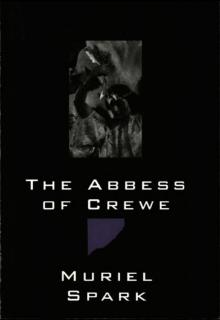 The Abbess of Crewe: A Modern Morality Tale
The Abbess of Crewe: A Modern Morality Tale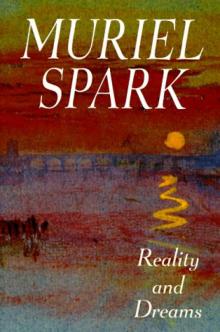 Reality and Dreams
Reality and Dreams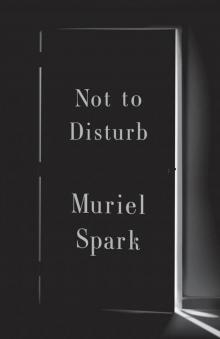 Not to Disturb
Not to Disturb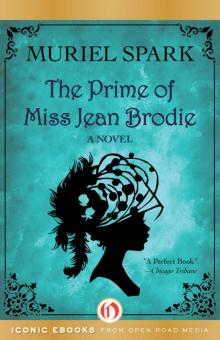 The Prime of Miss Jean Brodie
The Prime of Miss Jean Brodie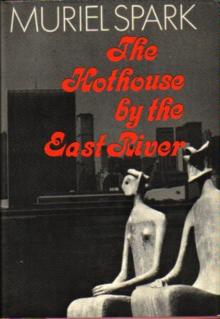 The Hothouse by the East River
The Hothouse by the East River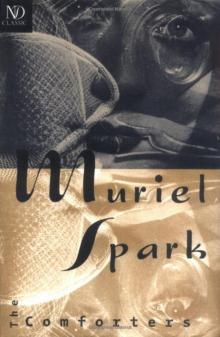 The Comforters
The Comforters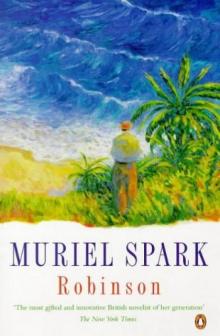 (1958) Robinson
(1958) Robinson Unknown
Unknown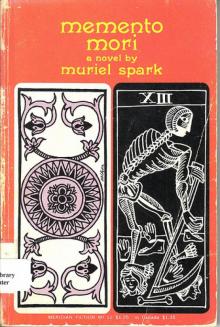 Memento Mori
Memento Mori The Finishing School
The Finishing School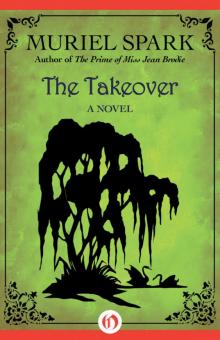 The Takeover
The Takeover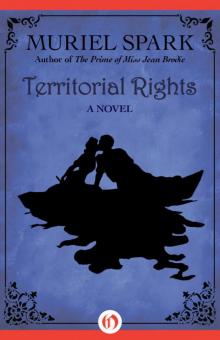 Territorial Rights
Territorial Rights The Complete Short Stories
The Complete Short Stories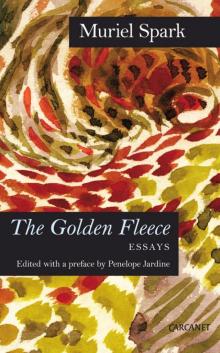 The Golden Fleece: Essays
The Golden Fleece: Essays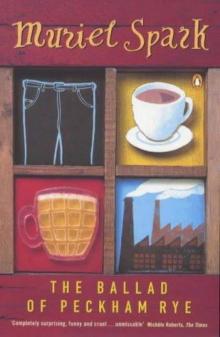 The Ballad of Peckham Rye
The Ballad of Peckham Rye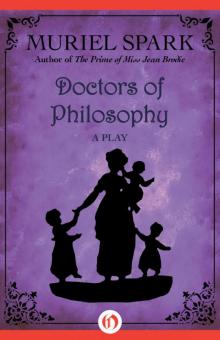 Doctors of Philosophy: A Play
Doctors of Philosophy: A Play The Mandelbaum Gate
The Mandelbaum Gate Loitering With Intent
Loitering With Intent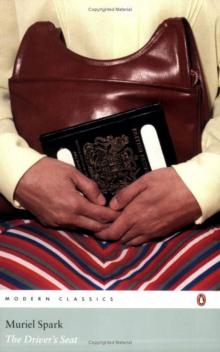 The Driver's Seat
The Driver's Seat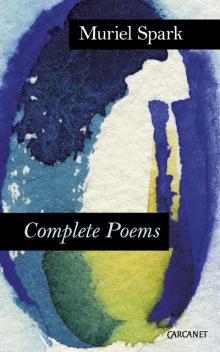 Complete Poems: Muriel Spark
Complete Poems: Muriel Spark Symposium
Symposium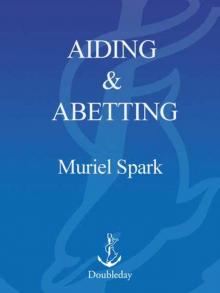 Aiding and Abetting
Aiding and Abetting The Golden Fleece
The Golden Fleece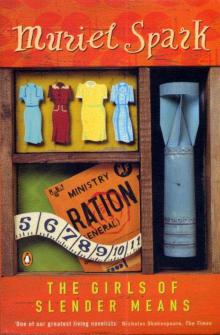 The Girls of Slender Means
The Girls of Slender Means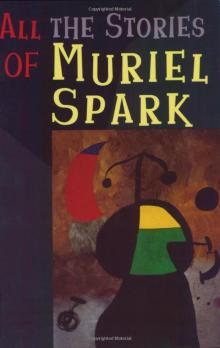 Alice Long’s Dachshunds
Alice Long’s Dachshunds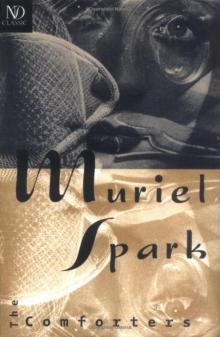 (1954) The Comforters
(1954) The Comforters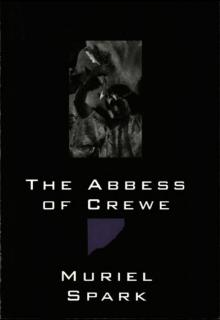 The Abbess of Crewe
The Abbess of Crewe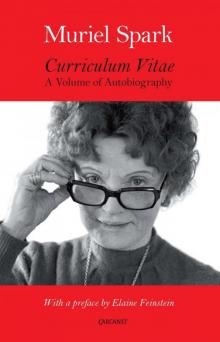 Curriculum Vitae
Curriculum Vitae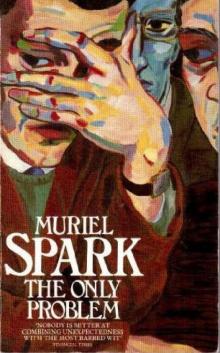 The Only Problem
The Only Problem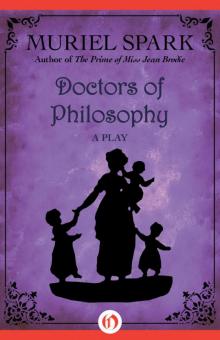 Doctors of Philosophy
Doctors of Philosophy